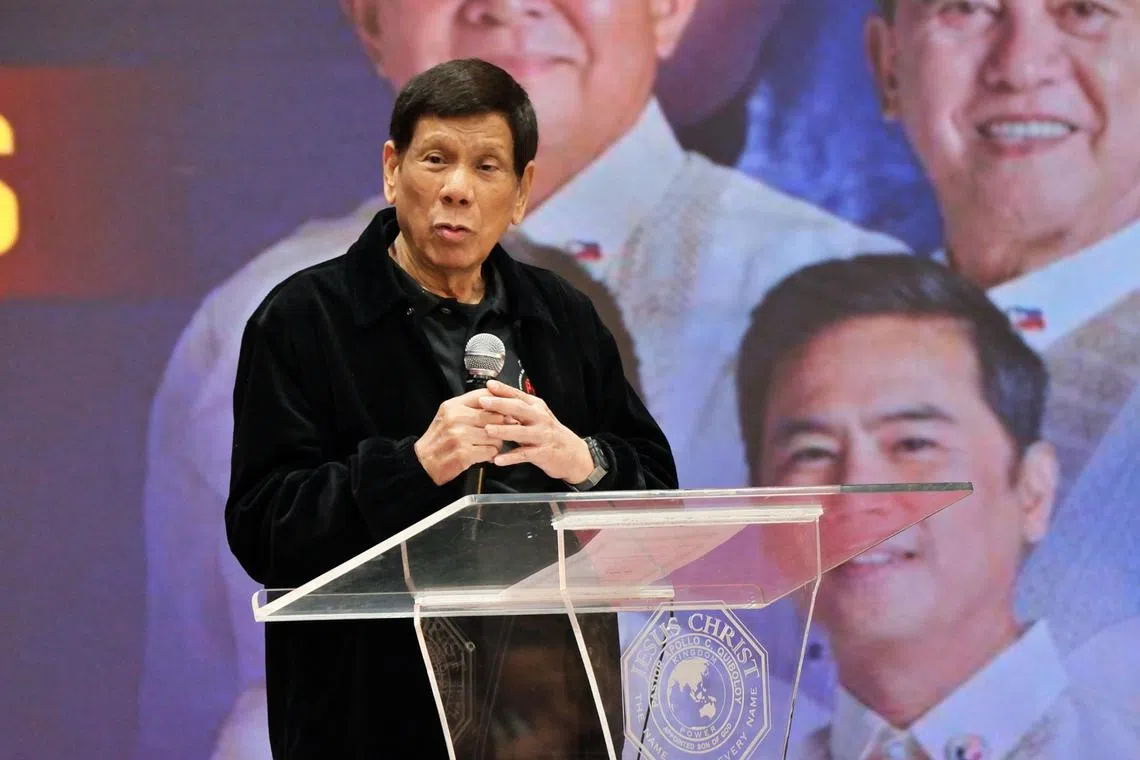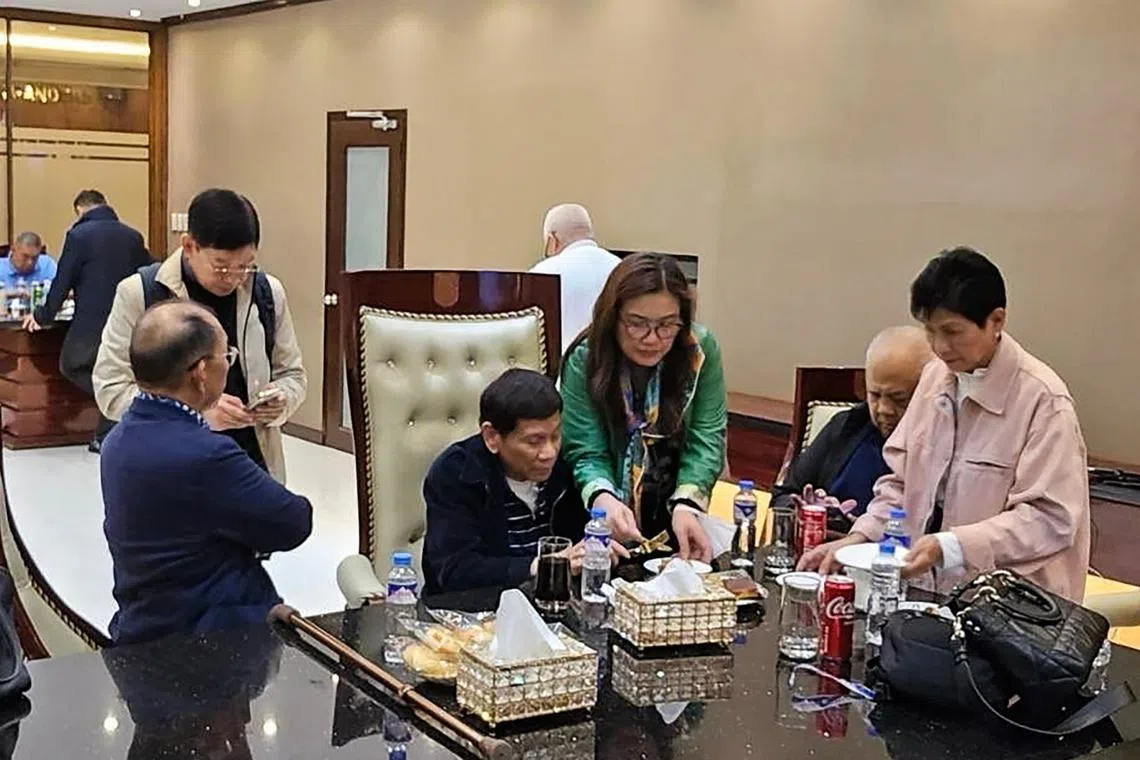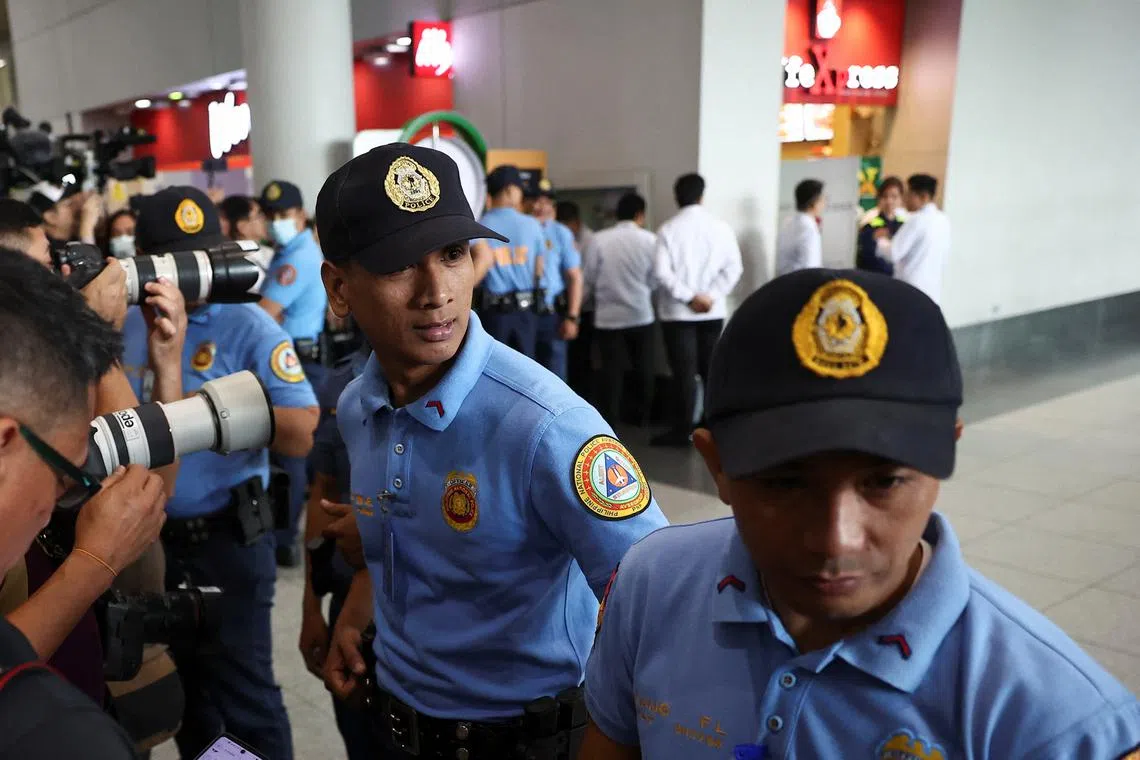Ex-Philippine president Duterte arrested over deadly drug war after ICC issues warrant
Sign up now: Get insights on Asia's fast-moving developments

Former Philippine president Rodrigo Duterte at a gathering with the Philippine community in Hong Kong on March 9.
PHOTO: EPA-EFE
MANILA – Former president Rodrigo Duterte, once the Philippines’ firebrand leader, is in custody
The tribunal had sought assistance from global police organisation Interpol to enforce the arrest warrant. It was served as soon as Mr Duterte, 79, landed in Manila on the morning of March 11, a day after a campaign event in Hong Kong with his political party’s senatorial candidates.
The Philippine National Police (PNP) cooperated, as President Ferdinand Marcos Jr has signalled his administration’s willingness to comply with the ICC directive.
Mr Duterte was detained for about nine hours at the military-run Villamor Airbase before he was escorted onto a chartered jet that was to take him to the ICC headquarters in The Hague, Netherlands, to face charges. The plane took off past 11pm. His trial date is yet to be announced.
In the 15-page warrant dated March 7, a copy of which was obtained by The Straits Times, the ICC’s three-judge panel said there were reasonable grounds to believe that the killings of drug suspects that Mr Duterte ordered between 2011 and 2019 were “both widespread and systematic”.
That period covered Mr Duterte’s bloody crackdown both as mayor of the southern Philippine city of Davao from 2011 to 2016, and his nationwide war on drugs during the first half of his six-year presidential term from 2016 to 2019. He ran the drug war until the end of his presidency in 2022.
“The Chamber finds reasonable grounds to believe that Mr Duterte is individually responsible for the crime against humanity of murder,” the ICC judges wrote.
Police say over 6,000 drug suspects were killed in Mr Duterte’s drug war. But rights groups claim the death toll could be twice as high, including unreported extrajudicial killings allegedly carried out by police and vigilantes.
Presidential office Malacanang confirmed to reporters that Interpol Manila received a copy of the ICC arrest warrant a few hours before Mr Duterte’s arrival in Manila.
This is a stark reversal from Mr Marcos’ earlier dismissal of the ICC’s jurisdiction, when he argued that the tribunal had no business intervening in the country’s internal affairs.
But his position shifted following his political fallout with the Duterte family. Tensions escalated in February after Mr Duterte’s daughter, Vice-President Sara Duterte, was impeached over her assassination threat against Mr Marcos
This then triggered Mr Duterte to use his recent campaign speeches to accuse his successor of being a drug addict, an allegation Mr Marcos has repeatedly denied.
Though he is no longer in power, Mr Duterte remains an influential political figure in the Philippines. He had largely enjoyed immunity from allegations against him in relation to his anti-drug campaign – that is, until his arrest on March 11 upon the ICC’s orders.

Mr Duterte (centre) inside the Villamor Airbase in Pasay City, Metro Manila, after arriving from Hong Kong on March 11.
PHOTO: AFP
Mr Duterte’s arrest is a “critical step for accountability in the Philippines”, said Human Rights Watch deputy Asia director Bryony Lau in a statement.
“His arrest could bring victims and their families closer to justice and send the clear message that no one is above the law,” said Mr Lau, as he urged the Marcos government to swiftly surrender Mr Duterte to the ICC.
The ICC lacks its own police force, relying instead on Interpol and its member states to carry out arrests. The court issued a diffusion request to Interpol to officially seek its cooperation in arresting the former president.
The PNP, accompanied by an Interpol representative, served Mr Duterte the warrant inside the airport. He was then escorted through a back exit and whisked away in a police van, along with his common-law wife Honeylet Avancena, to the nearby airbase.
Mr Duterte insists his arrest is unlawful, saying he was neither shown a copy of the warrant nor allowed to be with his lawyer when he was placed under custody.
“(Tell) me now the legal basis for my being here. Apparently, I was brought here not of my own volition; it was somebody else’s… You have to answer now for the deprivation of (my) liberty,” said Mr Duterte in a video recorded in his holding room at the airbase, which was posted on Instagram by his 20-year-old daughter Veronica.
But ICC Prosecutor-General Richard Fadullon said in a statement on March 11 afternoon that Mr Duterte had been read his rights and informed of the charges against him earlier in the day.
Two hours before he boarded the plane, Mr Duterte had tried negotiating with the police.
“We already withdrew from the ICC. Why are you bringing me before an international body that the country is no longer a member of?” Mr Duterte said, as his younger daughter posted an Instagram Live video of his conversation with the police before he boarded the plane.
Before this, the Duterte camp was quick to try various ways to get the former president out of detention. His younger daughter shared on Instagram a doctor’s note advising that Mr Duterte should be hospitalised to avoid complications due to diabetes. But Manila has not responded to this.
“They are denying my dad the proper healthcare he needs... He is getting weaker by the minute,” Ms Duterte said as she shared a photo of her father asleep in his holding room with an oxygen tank and tube attached to his nose.
Mr Duterte, through his lawyer, filed a petition with the Philippine Supreme Court on March 11 seeking a temporary restraining order for his arrest. His co-petitioner is Senator Ronald dela Rosa, who is also under ICC investigation for implementing the drug war as Mr Duterte’s former police chief. But the plane left for the Netherlands without the court issuing a ruling.

Police were on standby for the arrival of Mr Duterte at Manila’s Ninoy Aquino International Airport on March 11.
PHOTO: REUTERS
The Philippines is no longer an ICC member, having withdrawn from the Rome Statute, the ICC’s founding treaty, in 2019 under Mr Duterte’s directive. But the tribunal says it still has jurisdiction over alleged crimes committed while the country was a member.
The families of Mr Duterte’s drug war victims welcomed his arrest in a statement posted on Facebook by their legal counsel and ICC-accredited lawyer Kristina Conti.
“It’s about time Marcos fulfils his obligation to hold Duterte accountable. We have long been waiting for this,” the families said. “We are hoping that justice would finally be served to all the victims.”
The ICC has yet to announce if arrest warrants would be issued for other former Philippine officials also under investigation for their roles in Mr Duterte’s drug war.
Mara Cepeda is Philippines correspondent at The Straits Times.



